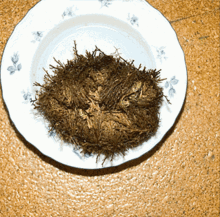This is an old revision of this page, as edited by Plantdrew (talk | contribs) at 21:09, 15 February 2015 (→See also: delink ambiguous common name). The present address (URL) is a permanent link to this revision, which may differ significantly from the current revision.
Revision as of 21:09, 15 February 2015 by Plantdrew (talk | contribs) (→See also: delink ambiguous common name)(diff) ← Previous revision | Latest revision (diff) | Newer revision → (diff)A resurrection plant is any poikilohydric plant that can survive extreme dehydration, even over months or years.

Examples include
- Anastatica hierochuntica, also known as the Rose of Jericho, a plant species native to deserts of North Africa
- Asteriscus (plant);
- Boea hygrometrica
- Haberlea rhodopensis
- Mesembryanthemum.
- Tillandsia
- Myrothamnus flabellifolius, a plant species native to Southern Africa
- Ramonda serbica, a species in the Gesneriaceae family
- Selaginella lepidophylla, a plant species native to North America, Central and South America, and sold as a novelty
- Lichen, a symbiosis that can survive in extreme desiccation
Certain resurrection plants have long been sold in their dry, "lifeless" form as curiosities. This custom was noted by many 19th century authors, and continues today.
See also
- Dehydration
- Cryptobiosis
- Anhydrobiosis
- Hygrochasy
- Pleopeltis polypodioides, the resurrection fern
References
- ^ Liberty Hyde Bailey (1916). The Standard Cyclopedia of Horticulture. Vol. 5. The Macmillan company. pp. 2920–2921, 3639.
- Attention: This template ({{cite doi}}) is deprecated. To cite the publication identified by doi:10.1371/journal.pone.0030531, please use {{cite journal}} (if it was published in a bona fide academic journal, otherwise {{cite report}} with
|doi=10.1371/journal.pone.0030531instead. - "Resurrection Plant". Faculty.ucc.edu. Retrieved 2012-01-30.
If an internal link led you here, you may wish to edit the linking article so that it links directly to the intended article.
This botany article is a stub. You can help Misplaced Pages by expanding it. |